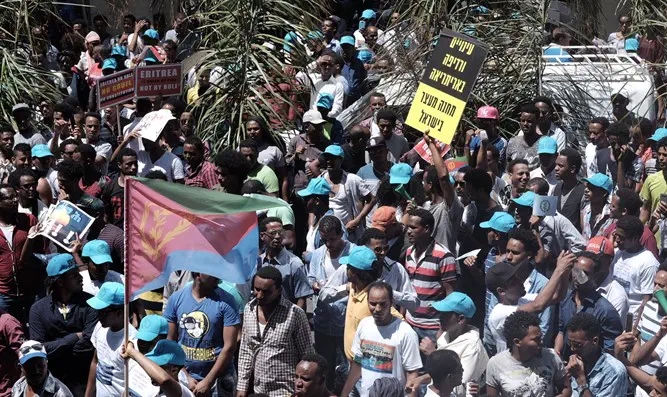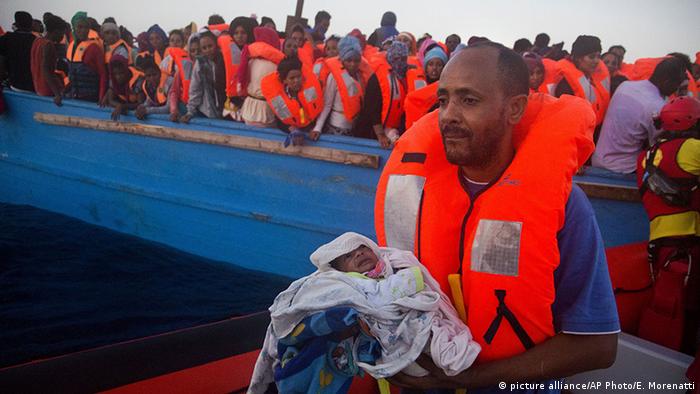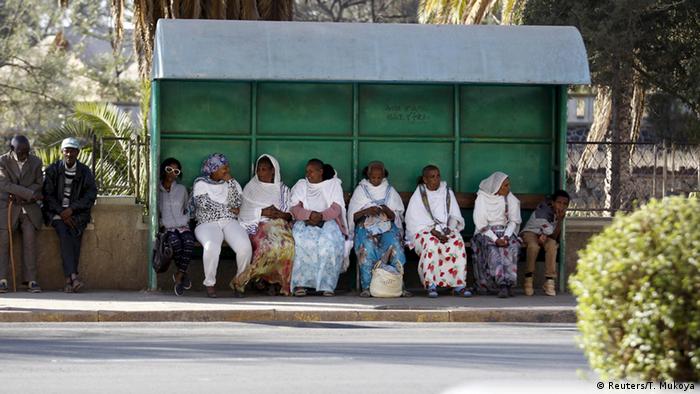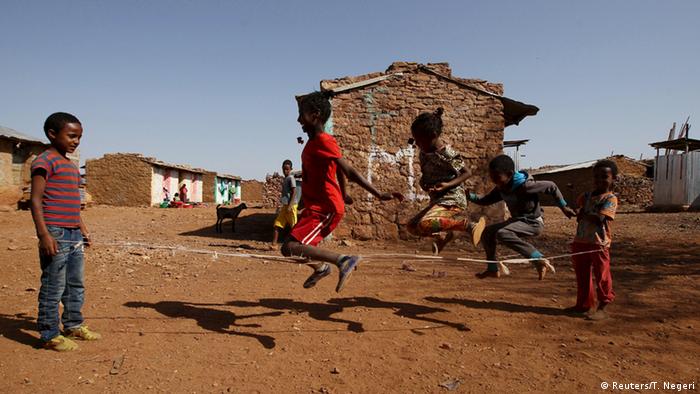The Interior Ministry has rejected the asylum requests of thousands of Eritreans based solely on their status as army deserters in their home country, a precedent that can no longer continue after new ruling.
Ilan Lior Sep 05, 2016 9:22 AM

Eritrean asylum seekers protest against their government at the EU's office in Ramat Gan on June 21, 2016. Credit Moti Milrod
- Why are the Jews not preparing a plan to help the refugees?
- At least 7,000 Eritreans in Israel survived torture, rape in Sinai
- Israel outright rejects asylum requests by Eritreans and Sudanese
- For Eritrean asylum seekers in Israel, cycling success is overshadowed by threat of jail
A custody appeals tribunal Sunday overruled the Interior Ministry’s legal opinion that Eritreans who deserted from their country’s army are never entitled to refugee status. The ministry has used this opinion to reject asylum applications for thousands of Eritreans.
The ruling could affect tens of thousands of Eritreans in Israel. Those whose asylum requests have been rejected are now likely to ask that they be considered. For those whose applications are still pending, the state will no longer be able to systematically reject them because they were based on desertion or draft-dodging.
In addition, over the past year, the state has used a procedural issue – the fact that the applications were submitted more than a year after the asylum seeker entered Israel – to reject many asylum applications without even discussing them. Now, Eritrean asylum seekers will be able to argue that they didn’t bother submitting applications before because they knew they would be rejected, but in light of Sunday’s ruling, the circumstances have changed.
According to information provided by the ministry’s Population, Immigration and Border Authority in response to a freedom of information request by Haaretz, from 2009 until the start of July 2016, Eritrean nationals submitted 7,218 asylum requests in Israel. Of these, only eight were approved, while 3,105 are still awaiting a response. All the others were either rejected or withdrawn.
Commenting on this data, Elad Azar, the custody judge hearing the case in Jerusalem, wrote, “Even in the completely theoretical case in which it was found that refugee status had to be granted to all those asylum seekers, I believe this isn’t a quantity Israel is incapable of digesting or that would lead to unreasonable results, given that in any case, all of them are expected to remain in Israel for a long time even if their applications are rejected.”
Azar said the state can’t refuse to apply the 1951 Refugee Convention to an entire group of asylum seekers making similar claims just because that group is large. If a person deserted for political reasons and would face an exceptionally harsh sentence if he returned, this could justify refugee status, it said.
“In general, desertion in and of itself doesn’t constitute grounds for granting political asylum,” wrote Azar. “But desertion that is seen as expressing a political view, and for which the punishment exceeds reasonable bounds, could amount to persecution in the sense in which Israel interprets the Refugee Convention.”
This would not apply to someone who deserted due to economic reasons, conscientious objection “or ordinary ‘cowardice,’” Azar stressed. But if a deserter’s government views the desertion as a political act, it could justify granting asylum.
One of the ministry’s arguments in the case was that if its legal opinion were rejected, Israel could be forced to grant asylum to thousands of Eritreans, with serious consequences. But Azar rejected that argument.
“Limiting the protection given under the Refugee Convention by not applying it to people entitled to refugee status, just because there are many of them, doesn’t comply with the Refugee Convention or the rules of Israeli administrative law,” he wrote. “We are talking about the personal, individual rationales of many people, not about a general group rationale.”
The appeal was filed two years ago on behalf of an Eritrean asylum seeker by Tel Aviv University’s Refugee Rights Clinic and the Hotline for Refugees and Migrants. The asylum request was based on his having deserted from the Eritrean army and then leaving the country, in violation of the law.
On the basis of the ministry’s legal opinion, the interior minister’s advisory committee on refugee affairs had rejected his application without even considering it. The appeals tribunal did not order the committee to accept the application, but did say it had to reconsider the issue without reference to this opinion.
“We can’t accept the clear trend in the cases that have been brought to this tribunal to date, in which asylum requests by Eritrean nationals that are based on claims of having evaded or deserted from military/national service are rejected at hasty meetings, without any reason, and without even being discussed by the full advisory committee on refugee affairs and brought to the interior minister for a decision,” Azar wrote.
Attorney Anat Ben-Dor of the Refugee Rights Clinic, who submitted the appeal, welcomed the tribunal’s decision. The ruling “requires the Interior Ministry to discuss individual applications for asylum in accordance with the rules of the Refugee Convention, without relying on an opinion that was meant to be a tool for systematically rejecting thousands of asylum requests,” she said.
Now, she added, the ministry should reconsider all the applications that were rejected on the basis of this opinion.
Reut Michaeli, executive director of the Hotline for Refugees and Migrants, said, “It’s regrettable that judicial intervention was needed so that the Interior Ministry would apply the rules of the Refugee Convention, to which Israel is committed, instead of trying to find tortuous ways of circumventing them. In every Western country, large proportions of Eritrean asylum seekers are accepted as refugees, and just recently, another UN report revealed the torture, slave conditions and systematic human rights violations that happen in the Eritrean army, and in the country in general.
“I hope that now, the asylum system will finally begin to operate in compliance with international standards,” she added.
Ilan Lior
Haaretz Correspondent
read more: http://www.haaretz.com/israel-news/.premium-1.740249
Ilan Lior Sep 05, 2016 9:22 AM
0comments Zen Subscribe
Shareshare on facebook Tweet send via email reddit stumbleupon
Eritrean asylum seekers protest against their government at the EU's office in Ramat Gan on June 21, 2016. Moti Milrod
Why are the Jews not preparing a plan to help the refugees?
At least 7,000 Eritreans in Israel survived torture, rape in Sinai
Israel outright rejects asylum requests by Eritreans and Sudanese
For Eritrean asylum seekers in Israel, cycling success is overshadowed by threat of jail
A custody appeals tribunal Sunday overruled the Interior Ministry’s legal opinion that Eritreans who deserted from their country’s army are never entitled to refugee status. The ministry has used this opinion to reject asylum applications from thousands of Eritreans.
The ruling could affect tens of thousands of Eritreans in Israel. Those whose asylum requests have been rejected are now likely to ask that they be considered. For those whose applications are still pending, the state will no longer be able to systematically reject them because they were based on desertion or draft-dodging.
In addition, over the past year, the state has used a procedural issue – the fact that the applications were submitted more than a year after the asylum seeker entered Israel – to reject many asylum applications without even discussing them. Now, Eritrean asylum seekers will be able to argue that they didn’t bother submitting applications before because they knew they would be rejected, but in light of Sunday’s ruling, the circumstances have changed.
According to information provided by the ministry’s Population, Immigration and Border Authority in response to a freedom of information request by Haaretz, from 2009 until the start of July 2016, Eritrean nationals submitted 7,218 asylum requests in Israel. Of these, only eight were approved, while 3,105 are still awaiting a response. All the others were either rejected or withdrawn.
Commenting on this data, Elad Azar, the custody judge hearing the case in Jerusalem, wrote, “Even in the completely theoretical case in which it was found that refugee status had to be granted to all those asylum seekers, I believe this isn’t a quantity Israel is incapable of digesting or that would lead to unreasonable results, given that in any case, all of them are expected to remain in Israel for a long time even if their applications are rejected.”
Azar said the state can’t refuse to apply the 1951 Refugee Convention to an entire group of asylum seekers making similar claims just because that group is large. If a person deserted for political reasons and would face an exceptionally harsh sentence if he returned, this could justify refugee status, it said.
“In general, desertion in and of itself doesn’t constitute grounds for granting political asylum,” wrote Azar. “But desertion that is seen as expressing a political view, and for which the punishment exceeds reasonable bounds, could amount to persecution in the sense in which Israel interprets the Refugee Convention.”
This would not apply to someone who deserted due to economic reasons, conscientious objection “or ordinary ‘cowardice,’” Azar stressed. But if a deserter’s government views the desertion as a political act, it could justify granting asylum.
One of the ministry’s arguments in the case was that if its legal opinion were rejected, Israel could be forced to grant asylum to thousands of Eritreans, with serious consequences. But Azar rejected that argument.
“Limiting the protection given under the Refugee Convention by not applying it to people entitled to refugee status, just because there are many of them, doesn’t comply with the Refugee Convention or the rules of Israeli administrative law,” he wrote. “We are talking about the personal, individual rationales of many people, not about a general group rationale.”
The appeal was filed two years ago on behalf of an Eritrean asylum seeker by Tel Aviv University’s Refugee Rights Clinic and the Hotline for Refugees and Migrants. The asylum request was based on his having deserted from the Eritrean army and then leaving the country, in violation of the law.
On the basis of the ministry’s legal opinion, the interior minister’s advisory committee on refugee affairs had rejected his application without even considering it. The appeals tribunal did not order the committee to accept the application, but did say it had to reconsider the issue without reference to this opinion.
“We can’t accept the clear trend in the cases that have been brought to this tribunal to date, in which asylum requests by Eritrean nationals that are based on claims of having evaded or deserted from military/national service are rejected at hasty meetings, without any reason, and without even being discussed by the full advisory committee on refugee affairs and brought to the interior minister for a decision,” Azar wrote.
Attorney Anat Ben-Dor of the Refugee Rights Clinic, who submitted the appeal, welcomed the tribunal’s decision. The ruling “requires the Interior Ministry to discuss individual applications for asylum in accordance with the rules of the Refugee Convention, without relying on an opinion that was meant to be a tool for systematically rejecting thousands of asylum requests,” she said.
Now, she added, the ministry should reconsider all the applications that were rejected on the basis of this opinion.
Reut Michaeli, executive director of the Hotline for Refugees and Migrants, said, “It’s regrettable that judicial intervention was needed so that the Interior Ministry would apply the rules of the Refugee Convention, to which Israel is committed, instead of trying to find tortuous ways of circumventing them. In every Western country, large proportions of Eritrean asylum seekers are accepted as refugees, and just recently, another UN report revealed the torture, slave conditions and systematic human rights violations that happen in the Eritrean army, and in the country in general.
“I hope that now, the asylum system will finally begin to operate in compliance with international standards,” she added.
Ilan Lior
Haaretz Correspondent
skip -
You Might also Like
Haaretz | Jewish World
Who Really Wrote the Book of Isaiah?
Haaretz | Opinion
Miri Regev’s Modesty Patrol Is Israel's Burkini Ban
Haaretz | News
Mother Teresa's Milestones: A Timeline From the Life of a Saint
From The Web
Mansion Global
How Brexit is affecting the luxury property market in London
From The Web
Radar Online
Hillary Collapses! Aides Rush To Keep Clinton From Falling
From The Web
Elvenar
This game will keep you up all night! Build your city!
Recommended by
skip all comments
Comments
Sign in to join the conversation.
skip - video
Why Trump Wearing a Tallit Unsettles Many Jews
El Al Wields Unlikely Political Clout In, of All Places, Hong Kong
Over-policing? It's Israel's Over-armying That Should Be Halted
Train Chaos Is Only the First Stop in ultra-Orthodox Parties' Battle for Shabbat
Asylum seekers
Today's Most Read
In Bloodiest Day in Years, Turkey Pounds Kurdish Forces Near Iraq Border
WATCH Christian Pastor Gives Donald Trump a Jewish Prayer Shawl, Riles Confused Internet
Security Heightened as Jewish, Muslim Students Threatened at South Carolina School
Despite Media Blitz, Israelis Refused to Believe Netanyahu on Train Crisis
Israeli Archaeologists Dodge the Law to Study Human Remains
Am I a 'Disgusting Racist' for Calling Palestinians Evil When They Sanctify Death and Jew Hatred?
Miri Regev’s Modesty Patrol Is Israel's Burkini Ban
Family Values
Nanorobots Could Soon Be Roaming Your Body, Saving Your Life Thanks to Israeli Scientists
U.S. Ban on Certain Soaps Leads Health Ministry to Weigh Situation in Israel
skip - Subscribe element
Subscribe to Haaretz today
Only $1 for the first month
More Top Stories
AG to Decide This Month on Incitement Charges Against Rabbi
By Yotam Berger5 Hours Ago This is a primium article
Israeli Insurance Company Sued for Giving Free Tire Changes - for Women Only
By Sharon Pulwer6 Hours Ago This is a primium article
Palestinian Activist Claims Political Persecution After Indictment Over Offenses Dating From 2013
By Yotam Berger7 Hours Ago This is a primium article
Earth to Space Minister Akunis
By Ido Efrati8 Hours Ago This is a primium article
skip -
More From the Web
Nikkei Asian Review
North Korea's Kim tightens grip with ruthless crackdowns
Mansion Global
Amazing New York Luxury Properties You Have to See to Believe
Get App
Bye Bye Skype – 8 Alternatives for the Modern Business
StudyLifeStyle
Now You Can Track Your Car Using Your Smartphone
Recommended by
FAQ
Contact us
Newsletters
Terms and conditions
Privacy policy
Management
Editorial
Accessibility
Advertise on Haaretz.com
RSS Contact us Download our Android app Download our iOS app gPlus Facebook Twitter
Israel News
Middle East
Jewish World
U.S./World
Business
Partnerships
Israel Real Estate
HAARETZ VOD
Dan Hotels in Tel Aviv
Life
Archaeology
Science
Sports
Culture
Purim
Books
Travel
Theater
Movies and TV
Food
Poem of the Week
Columnists
Bradley Burston
Chemi Shalev
Allison Kaplan Sommer
Anshel Pfeffer
Sayed Kashua
Ilene Prusher
David Rosenberg
Carlo Strenger
Vered Guttman
Mira Sucharov
Opinion
Daily Cartoon
Letters to the Editor
הארץ
חדשות
גלריה
ריו 2016
ספורט
ספרים
סרטים מומלצים
קפטן אינטרנט
TheMarker
Finance
חדשות
שוק ההון
צרכנות
נדל"ן
Haaretz.com, the online edition of Haaretz Newspaper in Israel, and analysis from Israel and the Middle East. Haaretz.com provides extensive and in-depth coverage of Israel, the Jewish World and the Middle East, including defense, diplomacy, the Arab-Israeli conflict, the peace process, Israeli politics, Jerusalem affairs, international relations, Iran, Iraq, Syria, Lebanon, the Palestinian Authority, the West Bank and the Gaza Strip, the Israeli business world and Jewish life in Israel and the Diaspora.
© Haaretz Daily Newspaper Ltd. All Rights Reserved
skip - banner ruler labor
read more: http://www.haaretz.com/israel-news/.premium-1.740249



































